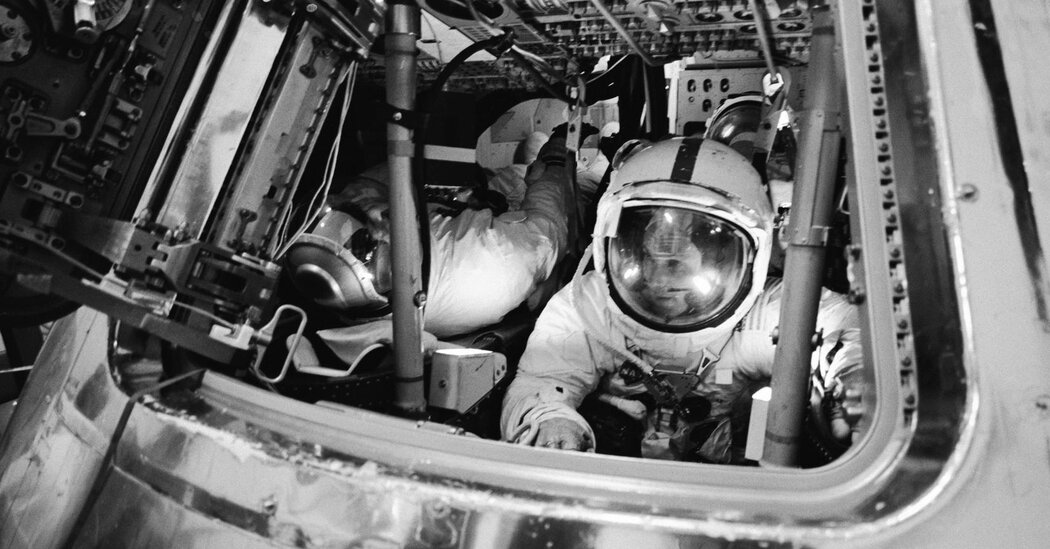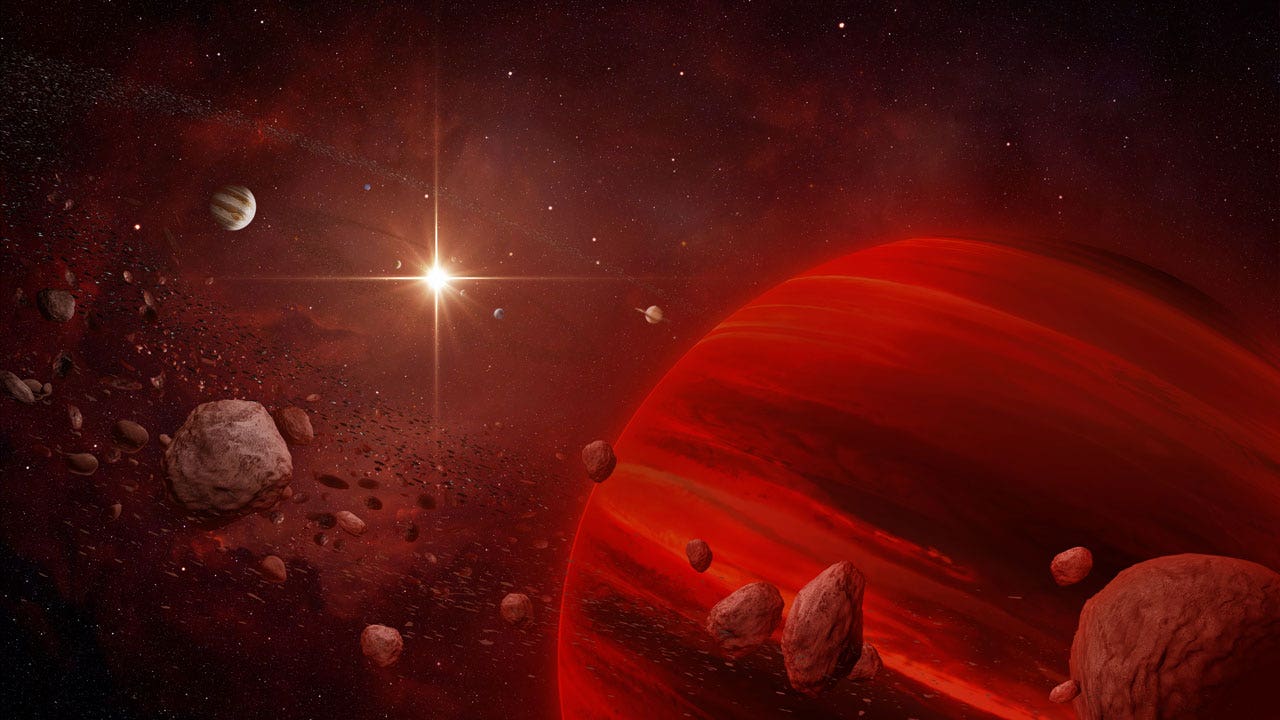Ken Mattingly, who orbited the moon and commanded two NASA shuttle missions, however was additionally remembered by humanity for the flight he did not make — the near-disastrous Apollo 13 mission — died Tuesday in Arlington, Virginia. 87.
His demise was confirmed by Cheryl Warner, a NASA spokeswoman. It didn’t specify the trigger or say whether or not he died at his house in Arlington or in a hospital there.
Mr. Mattingly, a former Navy pilot with a level in aeronautical engineering, joined NASA in 1966. However his first house flight didn’t come till April 1972, when the house company launched Apollo 16, the following to final manned mission into house. the moon.
He commanded the spacecraft command module in orbit whereas serving as lieutenant colonel, and took intensive pictures of the lunar terrain and carried out experiments whereas as commander. John W. Younger of the Navy and Lieutenant Colonel Charles M. Duke Jr. of the Air Power, after descending on the lunar lander, collected rock and soil samples from the highlands close to the crater often called Descartes.
Because the three astronauts made their approach again to Earth, Commander Mattingly stepped outdoors the spacecraft — which he named Casper due to the resemblance, a minimum of to a toddler’s eye, between an astronaut in a cumbersome house go well with and the cartoon character Casper the Pleasant Ghost.
As he maneuvered alongside the railing whereas hooked up to the spacecraft by a tether, he retrieved two film-bound packages containing photographs of the Moon that he had taken from contained in the capsule for evaluation again on Earth.
When the Apollo program ended, Commander Mattingly headed the Astronaut Help Workplace for the shuttle program, designed to move astronauts to and from the Earth-orbiting Worldwide Area Station.
In the summertime of 1982, he commanded the fourth and last take a look at flight of the shuttle Columbia, which accomplished 112 orbits. He was additionally the commander of the primary house shuttle flight carried out for the Division of Protection, a secret mission in January 1985 aboard Discovery.
All of those accomplishments got here after he was virtually eradicated on the final minute from the Apollo 13 mission in April 1970.
It was to orbit the Moon within the command module whereas the commander was in cost. Uncover James A. Lovell Jr. of the Navy and Fred W. Hayes Jr. of the lunar floor.
However NASA eliminated Commander Mattingly from the crew within the last days earlier than launch, when blood assessments confirmed he had not too long ago been uncovered to rubella from coaching with Colonel Duke, the backup lunar module pilot, who in flip had grow to be contaminated from his proximity to the moon. An injured baby at a neighborhood occasion. Commander Mattingly was the one one of many Apollo 13 crew who was discovered to lack antibodies towards the illness.
His co-pilot, John L. Swigert Jr., grew to become the command module pilot, leaving Commander Mattingly to watch the flight’s progress from mission management.
“Tall and lean, along with his brown hair practically cropped, Mattingly was maybe essentially the most non-public man within the astronaut workplace,” Andrew Chaikin wrote in his ebook Man on the Moon: The Journeys of the Apollo Astronauts (1994).
Chaiken added that he was additionally “within the depths of the worst despair of his life” after he was faraway from the Apollo 13 module.
However he is not going to be idle.
On the third day of the flight, an oxygen tank explosion within the spacecraft’s service module when it was about 200,000 miles from Earth knocked out energy and oxygen within the command module housing the three astronauts, elevating fears they might be stranded in house.
The truth is, Commander Mattingly didn’t contract rubella, and he performed an essential function within the plan devised by the astronauts and mission management in Houston to get them house safely.
The three astronauts crammed into the intact lunar module, although it was constructed to accommodate solely two astronauts and was solely designed to land on the Moon after which return to the orbiting mothership.
Commander Mattingly learn out an extended and detailed checklist of directions that astronauts should comply with as they use the lunar lander as a “lifeboat” to get them again towards Earth whereas they’re in need of power and meals.
Because the spacecraft and its hooked up lunar lander approached Earth, the astronauts moved again to the command module, which nonetheless had some battery energy and oxygen and carried the warmth defend wanted for a descent via the environment. The badly broken lunar module and repair module had been jettisoned, and the astronauts landed within the Pacific Ocean. They had been transferred by helicopter to the restoration ship, the plane provider Iwo Jima.
This horrific incident was recounted within the 1995 Hollywood movie “Apollo 13,” by which Gary Sinise performed Commander Mattingly.
Thomas Kenneth Mattingly II, identified to his colleagues as Ken, was born in Chicago on March 17, 1936, and grew up within the Miami space, the place his father labored for Jap Airways.
“I made each mannequin airplane I might discover, and I ate each field of cereal that had a paper airplane minimize out on the again,” he informed NASA in a 2001 oral historical past interview.
His father obtained permits to fly Jap between Miami and New York. As Mr. Mattingly remembers, “You went up the East Coast from Miami, north and again, it was an extended day.”
He earned his bachelor’s diploma from Auburn College in 1958, entered the Navy as an ensign, and after incomes his wings in 1960, flew from plane carriers. He joined the Astronaut Corps after attending Take a look at Pilot Faculty at Edwards Air Power Base in California.
After the Apollo and Area Shuttle missions, Mr. Mattingly continued to work for NASA within the Eighties. He retired from the Area Company and the Navy as a Rear Admiral and continued to work for aerospace firms.
His survivors embrace his spouse, Kathleen (Romilly) Mattingly, and his son, Thomas III.
When the film “Apollo 13” was launched, Mr. Mattingly once more raised questions on lacking the flight.
“It was very painful to be informed two days earlier than launch that you simply weren’t going to go, however there was a lot funding on this mission that it was actually the one choice,” he stated in an interview with Auburn College.
He added that over time he questioned what would have occurred if he had been on the aircraft. “However I can assure you from an emotional standpoint, I might have most popular to have been there, it doesn’t matter what occurred,” he stated.
Alex Troup Contributed to reviews.



